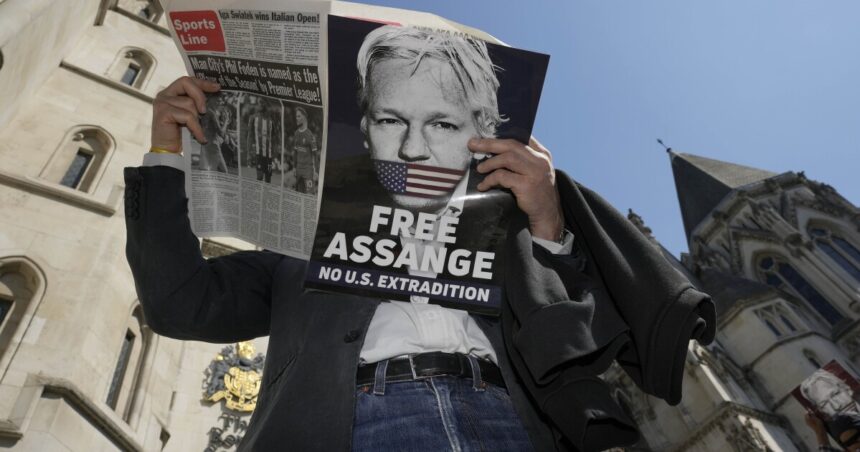WikiLeaks founder Julian Assange has been granted the right to appeal against his extradition to the United States on espionage charges, as ruled by a London court on Monday. This decision is likely to prolong the already lengthy legal process that Assange has been entangled in for some time.
High Court judges Victoria Sharp and Jeremy Johnson affirmed that Assange has legitimate grounds to challenge the extradition order issued by the United Kingdom’s government.
Assange, aged 52, faces indictment on 17 espionage charges and one charge of computer misuse due to his website’s release of a collection of classified U.S. documents almost 15 years ago. Upon hearing the news of the ruling, his supporters outside the Royal Courts of Justice cheered and applauded.
The Australian computer expert has spent the past five years in a high-security prison in Britain after seeking refuge in the Ecuadorian Embassy in London for seven years. Assange was absent from court during the ruling due to health reasons, as stated by his lawyer.
Assange’s legal team argued that the assurances provided by the U.S. were inadequate regarding the free press protections Assange would have if extradited. They claimed that the U.S. failed to guarantee the press protections afforded by the First Amendment of the U.S. Constitution.
Crime
Ex-CIA employee sentenced 40 years for sharing secrets with Wikileaks
1:03 PM, Feb 02, 2024
Lawyer Edward Fitzgerald argued that prosecutors had not sufficiently assured that Assange, as an Australian citizen claiming journalistic protections, would be able to rely on the press protections of the First Amendment if extradited to the U.S.
Furthermore, American prosecutors allege that Assange aided U.S. Army intelligence analyst Chelsea Manning in stealing diplomatic cables and military files that WikiLeaks published. Assange’s defense asserts that he acted as a journalist exposing U.S. military misconduct in Iraq and Afghanistan.
In March, the High Court judges had rejected most of Assange’s arguments but allowed him to appeal to the Court of Appeal if the U.S. assured that he would not face the death penalty and would be granted the same free speech protections as a U.S. citizen.
If Assange cannot rely on the First Amendment, the court stated that his extradition may be incompatible with the European Convention on Human Rights, which also guarantees free speech and media protections.
Crime
Pres. Biden to limit classified material after leak
4:38 PM, Apr 14, 2023
Although the U.S. provided reassurances, Assange’s legal team and supporters argue that they are insufficient, particularly regarding the protections under the First Amendment. The U.S. contends that Assange could potentially rely on the amendment, subject to a judge’s decision.
Attorney James Lewis, on behalf of the U.S., argued that Assange’s actions were not protected under the First Amendment, emphasizing that no individual, whether U.S. or foreign citizens, could rely on the amendment when publishing illegally obtained national defense information.
Amidst the legal proceedings, supporters held up banners urging President Joe Biden to release Assange. His lawyers fear he could face a lengthy prison sentence if convicted, despite American authorities suggesting a shorter term.
Assange’s family and supporters have expressed concerns over his deteriorating physical and mental health after years of legal battles and incarceration. There have been calls for his freedom and a resolution to the case.
President Biden’s consideration of a request from Australia to drop the case and allow Assange to return to his home country has brought some hope to his supporters. Australian Prime Minister Anthony Albanese has described the development as encouraging.





